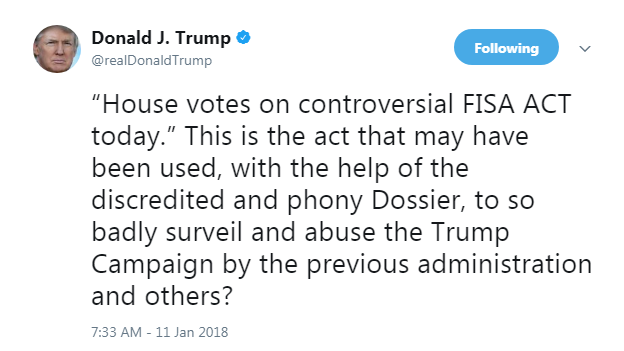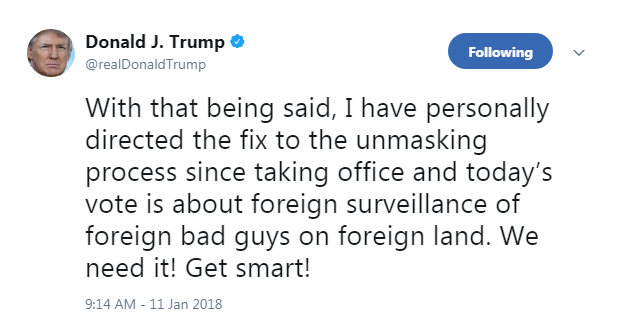It has been reported that Trump’s work day is unusually short — usually from 11am to 3pm. He doesn’t have the attention span or stamina for more. What does Trump do the rest of the time? He watches TV, makes phone calls, and tweets.
His tweets are the things that generate most news. And we’ve come to learn after almost a year that any tweets announcing any new policy is subject to reversal. One of his earliest presidential tweets was about banning transgender people from military service. Turns out, the military never had any intention of following that command. And transgender people are signing up for military service in droves.
So, skepticism greeted Trump’s tweet this morning:
These tweet is full of misinformation and supposition from Fox News (the dossier has not been discredited, and it is unlikely that the dossier alone formed the basis of a FISA warrant, and even if such a warrant was granted, it would have been used to surveil the Russians and not Trump people, unless of course, Trump people were unmasked because they were talking with the Russians. . . which doesn’t reflect a problem with the FISA warrant process in the first place)
The missive came during a period that Axios reported has become known as “executive time”—the stretch when Trump lounges around the White House private residence, sans aides and mostly watching television, before starting his workday. This is often when he sends his most outlandish tweets. Then, almost two hours later, and after already tweeting about a different topic (another story he’d seen on Fox and Friends), Trump walked back the comment at 9:14 a.m.:
Ummmmmm……
Today’s House vote us about a section of FISA called “702.” This targets *non*-US persons located outside the US. It requires FISA court authorization, but not for every individual target. Section 702 is set to expire January 19. Rand Paul is threatening a filibuster if there are no protections in place for Americans’ private information, which there are.
Let’s not mince words here: The lapse of Section 702 surveillance capabilities, even for a short time, would constitute a full-fledged national security emergency. The National Security Agency is on record as saying that “collection under FAA Section 702 is the most significant tool in the NSA collection arsenal for the detection, identification, and disruption of terrorist threats to the U.S. and around the world.”
And that’s why, Trump tweet aside, the Trump Administration is officially for its re-authorization, without any changes. Nunes tried to make changes in the bill related to unmasking, but those were pulled. In fact, White House cyber coordinator Rob Joyce said this morning there have “been no cases of 702 used improperly for political purposes.”
But the larger issue is the fact that Trump tweeted AGAINST the law, and then back-flipped.
This is at least the third time in the last week that the president has demonstrated his weak grasp on policy. During Monday’s meeting with leaders of both parties, Democratic Senator Dianne Feinstein floated the idea of a “clean” extension of the Deferred Action for Childhood Arrivals program—in other words, a bill with no other provisions attached. Republicans oppose a clean extension because they want to extract concessions from Democrats, such as spending on border security in exchange. Trump readily agreed to Feinstein’s idea of a clean extension, only to have House Majority Leader Kevin McCarthy awkwardly interrupt him and remind him of his own stated view. Within minutes, as my colleague Russell Berman wrote, Trump was saying something completely different. The meeting was intended to showcase Trump’s competence, and while some of the press coverage may have been what the White House wanted, the reality was it also showed Trump’s serious limitations.
Another curious case unfolded at a GOP retreat at Camp David over the weekend. Trump told assembled congressional leaders on Friday that he did not believe that public-private partnerships, the central mechanism for his administration’s (supposedly) forthcoming infrastructure bill, would work. The following day, economic adviser Gary Cohn presented the outlines of a plan, including the public-private partnerships, as the administration’s approach, as though nothing had happened. White House officials told The Washington Post that Trump is indeed skeptical of the partnerships.
The phenomenon of Trump contradicting aides, especially on foreign policy and especially Secretary of State Rex Tillerson, is at this point familiar, and has created chaos—and worries of more to come—on the world stage. As the last week demonstrates, domestic policy is no less susceptible to the problem.
This creates extensive challenges. Foreign leaders have long since realized Trump is a pushover who can easily be rolled in face-to-face meetings, eroding U.S. authority on the world stage. Republican leaders in Congress have desperately sought guidance from Trump on major initiatives, both to make sure he will not attack them and in the hopes that his leadership will help patch over divides within the party. The meager legislative accomplishments of this Congress speak to Trump’s inability to offer that guidance. Democrats seem fitfully interested in trying to make deals with Trump, but that’s impossible too, as Jonathan Chait wrote Wednesday: “It’s hard to make a deal with a president if the president doesn’t understand anything about the deal beyond his belief that deals are good.”
Yup.
Props to Talking Points Memo for this accurate headline:
UPDATE: House passes legislation to renew the Foreign Intelligence Surveillance Act, otherwise known as FISA. The bill reauthorizes for six years a powerful government authority to conduct foreign surveillance on U.S. soil.



